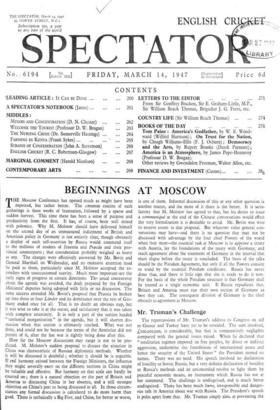BEGINNINGS AT MOSCOW
THE Moscow Conference has opened much as might have been expected, but rather better. The common routine of such gatherings is three weeks of frustration, followed by a sparse and sudden harvest. This time there has been a sense of purpose and productivity from the first. It has, of course, been well mixed with polemics. Why M. Molotov should have delivered himself on the second day of an unmeasured indictment of British and American policy in Germany is not entirely clear, though obviously a display of such self-assertion by Russia would commend itself to the millions of readers of Izvestia and Pravda and their pro- vincial counterparts ; that consideration probably weighed as heavy as any. The charges were effectively answered by Mr. Sevin and General Marshall on Wednesday, and no excessive attention need be paid to them, particularly since M. Molotov accepted the re- joinders with unaccustomed suavity. Much more important sre the early signs of progress in certain directions. Th‘t usual controversy about the agenda was avoided, the draft prepared by the Foreign Ministers' deputies being adopted with little or no discussion. The same success attended Mr. Bevin's proposal that Prussia be broken up into three or four Lander and its dominance over the rest of Ger- many ended once for all. That is no doubt an obvious step, but it was wise to take it at the outset, and satisfactory that it was taken with complete unanimity. It is only a part of the section headed "territorial reorganisation" in the agenda, but it will shorten dis- cussion when that section is ultimately reached. What was not done, and could not be because the terms of the Armistice did not permit of it, after the last war is rightly being done after this.
How far the Moscow discussions may range is not to be pre- dicted. M. Molotov's sudden proposal to discuss the situation in China was characteristic of Russian diplomatic methods. Whether it will be discussed is doubtful ; whether it should be is arguable. If real harmony existed between the Foreign Ministers, the influence they might severally exert on the different sections in China might be valuable and effective. But harmony on that scale can hardly be counted on ; there is a natural objection on the part of Britain and America to discussing China in her absence, and a still stronger objection on China's part to being discussed at all. In those circum- stances any formal discussion is calculated to do more harm than good. There is technically a Big Five, and China, for better or worse, is one of them. Informal discussion of this or any other question is another matter, and the more of it there is the better. It is satis- factory that M. Molotov has agreed to that, but his desire to issue a communiqué at the end of the Chinese conversations would effect the very formalisation it is desirable to avoid. Mr. Bevin was wise to reserve assent to that proposal But whatever value general con- versations may have—and there is no question that may not be discussed with advantage by the four chief Powers of the world when they meet—the essential task at Moscow is to approve a treaty with Austria, lay the foundations of the treaty with Germany, and reach agreement about the treatment of Germany in the interval that must elapse before the treaty is concluded. The basis of the talks should be the Potsdam Agreement, but only if all the Powers consent to stand by the essential Potsdam conditions. Russia has never done that, and there is little sign that she is ready to do it now. For the basis of the whole Potsdam structure is that Germany shall be treated as a single economic unit. If Russia repudiates that, Britain and America must run their own section of Germany as 'best they can. The consequent division of Germany is the chief obstacle to agreement at Moscow.


































